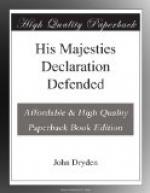The bitter controversy into which Dryden thrust himself was the culmination of eleven years’ political strife. In 1670, by the secret Treaty of Dover, Charles II and Louis XIV agreed that the English king should declare himself a Roman Catholic, and receive from his brother of France the equivalent of 80,000 pounds sterling and, in case of a Protestant rebellion, 6000 French soldiers. In addition, the two kings were pledged to undertake a war for the partition of the United Provinces. In the words of the late Lord Acton this treaty is “the solid substance of the phantom which is called the Popish Plot.” (Lectures on Modern History (1930), p. 211) The attempt to carry out the second part of the treaty was made in 1672, when England and France attacked the United Provinces which made a successful defence, aided by a coalition including the Emperor, Elector of Brandenburg, and King of Spain. The unpopularity of the war compelled Charles II to make peace in 1674. Meanwhile the King had taken a step to put into operation the first part of the Treaty of Dover by issuing a Declaration of Indulgence relieving Catholics and Dissenters alike from the penal laws. He was forced, however, to withdraw it and to give his assent to the Test Act which excluded from all public offices those unwilling to take the sacraments according to the rites of the Church of England. Henceforth Charles II abandoned all hope of restoring Catholicism, though his brother and heir, James, Duke of York, already a convert, remained resolute to secure at least toleration for his co-religionists. But many Englishmen continued to suspect the royal policy.
Roman Catholicism was feared and hated by many Englishmen for two distinct reasons. The first was based on bigotry, nourished by memories of the Marian persecution, the papal bull dethroning Elizabeth, Guy Fawkes’ Plot, and by apprehensions that a Catholic could not be a loyal subject so long as he recognized the temporal power of the Pope. The second was political and assumed that Catholicism was the natural support of absolutism. As Shaftesbury, the leader of the opposition, stated, popery and slavery went hand in hand. Such fears were deepened as the general purport of the Treaty of Dover became known.
Into this atmosphere charged with suspicion was interjected the Popish Plot, said by Titus Oates and his fellow perjurers to be designed to murder Charles II and place James on the throne. From September 1678, when Oates began his series of revelations until the end of March 1681, when the King dissolved at Oxford the third Parliament elected under the Protestant furore excited by the Plot, Shaftesbury and his followers had the upper hand. The King was obliged to propose concessions to the popular will and to offer to agree to limitations on the authority of a popish successor. But Shaftesbury was bent on passing the Exclusion Bill, which excluded James from the throne and substituted




